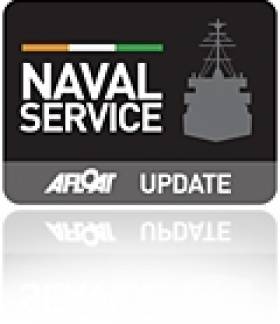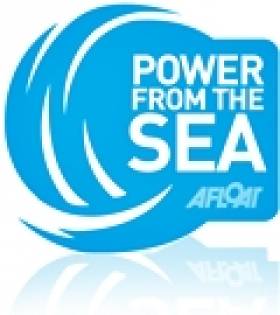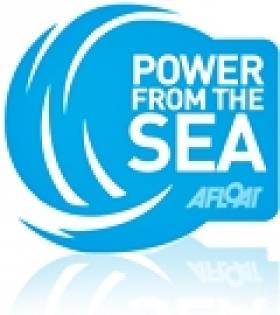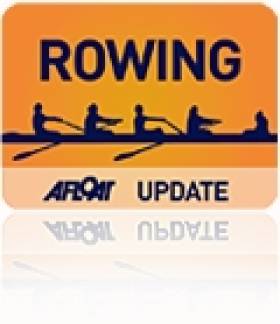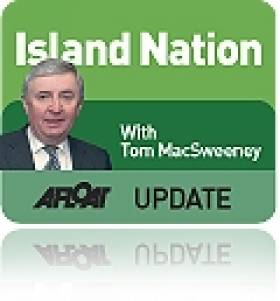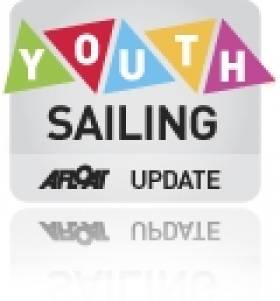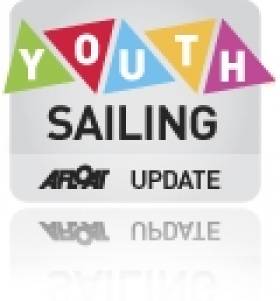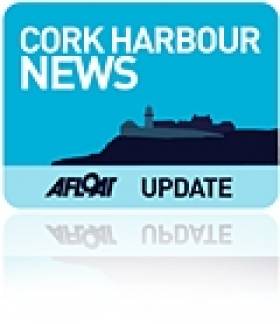Displaying items by tag: UCC
Navy Look to the Skies with Fuel-Saving Kite
#NAVAL SERVICE-The Naval Service are considering wind-power in an effort to reduce soaring fuel costs using "kite sails", reports the Examiner.
Commodore Mark Mellett confirmed the navy was collaborating with Irish Maritime and Energy Resource Cluster (IMERC), UCC, and CIT to develop "kite sails" which would be used to save fuel when a ship was carrying out surveillance.
"The kites would be used to reduce our energy bills, as we use 40% of the fuel allocated to the Defence Forces," said the commodore. "They could provide us with a speed of up to eight knots, which is as fast as a normal trawler."
The sails will have an added hi-tech edge (fitted with sensors to enhance the ships' radar capacity) which the service hopes to sell to other navies around the world. To read more about this story click HERE
IMERC’s Inaugural Conference 2012
#IMERC CONFERENCE - The recently established Irish Maritime and Energy Resource Cluster (IMERC) which is to promote the country as a world-renowned research and development location, is to host next month its inaugural conference entitled 'Maritime Geostrategic Thinking for Ireland'.
Minster for Marine, Simon Coveney T.D. will address the conference at the National Maritime College of Ireland (NMCI), Ringaskiddy, Co, Cork which is to be held on Friday 9th March.
In addition to keynotes speakers addressing the conference are Glenn Murphy (IMDO), Commodore Mellett of the Naval Service, Anthony Gurnee from Ardmore Shipping, Helen Noble, Head of Maritime Law at Matheson Ormsby and Prentice and Professor D John Mangan from the University of Newcastle.
Below is a programme schedule of the conference and additional information and link.
Session 1: Fighting recession by supporting an export led economy
Session 2: Building maritime security capability in support of economic development
Session 3: Future of Maritime Ireland
Session 4: IMERC Industry Engagement
To make a booking and receive further details on the conference contact IMERC Tel: (021) 433 5717 or by clicking HERE.
IMERC is based on the campus grounds of NMCI which is located between the Naval Service Base on Haulbowline Island and the neighbouring ferryport in Ringaskiddy.
Under phrase 1 of IMERC's campus development plans, it aims for the construction of the UCC National Beaufort Centre by May 2013. Phase 2 of the campus is for an extended maritime and energy science and commercial park located on the adjacent Port of Cork owned landbank.
UCC Wave Energy Trials Central to New Maritime Cluster
#POWER FROM THE SEA - A €9 million Europe-wide wave energy trial programme is one of the key elements of a new Government programme designed to transform Ireland as a maritime nation.
According to The Irish Times, University College Cork's Hydraulics and Maritime Research Centre will run testing of wave energy, tidal energy and offshore wind energy devices across a network of sites in 12 European countries participating in the new marine renewables infrastructure network Marinet.
Irish test sites in the network include the national ocean test facility in Cork and centres operated by the Sustainable Energy Authority of Ireland (SEAI) at Galway Bay and Belmullet.
The UCC centre also forms part of the new Irish Maritime and Energy Resource Cluster (IMERC), launched last Friday by Taoiseach Enda Kenny.
The cluster comprises UCC, the Irish Naval Service, Cork Institute of Technology and the National Maritime College of Ireland with the initial aim of creating 70 new research jobs by 2014 in the areas of wave energy, green shipping and sustainability of ocean resources.
IMERC director Dr Val Cummins said: “The aim of IMERC is to promote Ireland as a world-renowned research and development location that will unlock Ireland’s maritime and energy potential."
The Irish Times has more on the story HERE.
- Irish Naval Service
- maritime
- Cork
- Galway Bay
- Belmullet
- National Maritime College of Ireland
- wind energy
- UCC
- Cork Institute of Technology
- renewable energy
- wave energy
- sustainable energy
- tidal energy
- network
- testing
- Sustainable Energy Authority of Ireland
- Taoiseach Enda Kenny
- SEAI
- Hydraulics and Maritime Research Centre
- Marinet
- devices
- Irish Maritime and Energy Resource Cluster
- IMERC
- Dr Val Cummins
Cork Crews Rise to the Top at Cork Head
Cork crews saw off rivals from far and near at the Cork rowing Head of the River at the Marina on Saturday. UCC’s men’s senior eight were the fastest men’s crew – by 1.3 seconds from De Maas of Rotterdam, a masters eight. The fastest women’s crew was Cork Boat Club’s junior 18 eight, adjudged just .8 of a second quicker than UCD’s women’s senior eight. The fastest men’s single sculler was John Keohane of Lee Valley and Karen Corcoran-O’Hare of Shandon was the fastest women’s single sculler.
Cork Head of the River, The Marina, Cork, Saturday
Overall: 1 UCC men’s senior eight 12 minutes 6.7 seconds, 2 De Maas, Rotterdam men’s masters eight 12:08.0, 3 UCC men’s novice eight 12:25.9, 4 UCD men’s novice eight 12:42.4, 5 Presentation College men’s junior eight 12:44.3, 6 Muckross intermediate eight 12:49.9.
Men, Eight – Senior: UCC 12:06.7. Intermediate: Muckross 12:49.9. Novice: UCC 12:25.9. Junior: Presentation 12:44.3. Junior 16: Cork 13:21.2. Masters: De Maas 12:08.0.
Fours – Senior: Cork/Garda 12:53.6. Intermediate: UCC 13:40.6. Novice: Cappoquin 13:43.9. Junior 18, coxed: Presentation 13:04.0
Pair – Junior 18: Presentation 14:58.7. Masters: De Maas 13:09.9. Coastal – Novice: Ahakista 17:28.7.
Sculling, Quadruple – Senior: Shannon 13:50.8. Novice: Shannon 15:07.4. Junior 18: Cork 13:05.3. Junior 16: Cork 13:15.2.
Double – Intermediate: Cork IT 13:41.6. Junior 18: Clonmel 13:53.9. Junior 16: St Michael’s 15:04.4. Coastal – Novice: Kilmacsimon 16:17.2.
Single – Senior: Lee Valley (J Keohane) 14:16.4. Intermediate: Lee (O’Connell) 14:53.4. Novice: Lee (O’Connell) 14:37.9. Junior 18: Workmen’s (Burns) 14:33.0. Junior 16: Shandon (Casey) 15:08.9. Masters: Skibbereen (Barry) 15:40.07. Coastal – Novice: Kilmacsimon 17:33.6
Women – Overall: 1 Cork junior eight 13:40.0, 2 UCD senior eight 13:40.8, 3 St Michael’s junior eight 13:54.1.
Eight – Senior: UCD 13:40.8. Novice: UCC 14:25.4. Junior 18: 1 Cork 13:40.0. Junior 16: Clonmel 16:21.0.
Four – Senior: Muckross 14:15.9. Intermediate: UCC 17:00.9. Novice: UCC 16:29.8. Masters: Skibbereen 22:34.9.
Pair – Junior 18: St Michael’s 15:00.2.
Sculling, Quadruple - Novice: Shannon 15:51.4. Junior 16: St Michael’s 15:16.5.
Double – Intermediate: UCC 16:15.1. Junior 18: Cork 14:43.9. Junior 16: Lee 15:42.3. Masters: Cork 15:38.3.
Single – Senior: Intermediate: Shandon (K Corcoran-O’Hare) 15:39.7. Junior 18: Lee (Kearney) 16:52.1. Junior 16: Lee (Hamel) 16:13.6. Masters: Cork (Crowley) 17:49.2.
Coastal: 1 Kilmacsimon men’s novice double scull 16:17.2, 2 Ahakista men’s novice quadruple coxed scull 17:28.7.
Click this link for Irish Rowing detailsClick this link for the Latest Rowing News
How Many Times Do I Have to Say the Sea is Vital to Ireland?
Ireland has the largest maritime area-to-land mass in the European Union, but derives only 1% of GDP from the maritime sector. At a time when the economy needs every benefit it can get this figure is startling, particularly when compared to countries with other extensive coastlines, such as Norway where the figure is 20%, Denmark where it is 11% and even the UK which has increased its figure to 5%.
Despite being an island nation with a strong dependency on the sea, the Irish maritime economy is still in its infancy, both in terms of investment and of recognition.
Once again the importance of the sea was shown in the pre-Christmas weather problems. When air transport again failed the public, the ferries continued to operate. When road transport needed salt for gritting to keep roads open, it was ships which brought the salt to Ireland.
How many times do I have to challenge the ignorance and stupidity of the State, of Government, towards the sea? How many times do I have to remind the public of how dependent we are on the sea as an island nation?
Though still considered a low priority by Government, the maritime sector is worth €3 billion to the nation and supports 440,000 direct and indirect jobs. According to the Marine Institute in the "SeaChange Programme," this could be increased by at least 50%.
In Cork the Coastal and Marine Resources Centre which is part of UCC's Environmental Research Institute and has been working out of the Naval Base on Haulbowline Island has changed its name and is planning to move to a new maritime research facility. It has become the "Coastal and Marine Research Centre".
For over ten years the CMRC has been promoting the use of integrated coastal zone management as a means of achieving sustainable development in the use of coastal and marine resources, including marine ecology, seabed mapping, coastal processes, remote sensing, geology and geomatics.
A new maritime research facility is planned at Ringaskiddy, adjacent to the National Maritime College, part of the announced intention to establish a Maritime and Energy Research Campus and Commercial Cluster. The Department of Communications, Energy and Natural Resources, Bord Gais and the UCC Glucksman Foundation contributed funding, together with €7.5m. from the Higher Education Authority. As part of the National Ocean Energy Strategy, it will "bring together on one site the people, their ideas and the infrastructure to support the development of ocean energy," according to MERC Chairman, Peter Coyle. "Our aim is to produce innovative technical solutions to support the development of the Irish maritime sector."
This will include ocean energy opportunities, such as wave power where Irish companies have been leading the way. Shipping, logistics and maritime transport, marine recreation, maritime security research and maritime space applications are amongst other aspects of research work to be undertaken in Ringaskiddy.
Valerie Cummins, who led the Coastal Marine Resources Centre over past years has been appointed Director of MERC and is being replaced as Director at the newly re-named Coastal and Marine Research Centre by Jeremy Gault.
This article is reprinted by permission of the EVENING ECHO newspaper, Cork, where Tom MacSweeney writes maritime columns twice weekly. Evening Echo website: www.eecho.ie
Irish Team Ready for Student Yachting World Cup
Yesterday marked the beginning of the 30th Student Yachting World Cup (SYWoC), and for the Irish Team, it was the first opportunity for some of them to check out La Rochelle. This year's Team Ireland consists of a joint effort between UL, LIT and UCC.
The team consists of Skipper Robert O'Leary(UCC), Cian Gallagher (UL), John Blake (UL), Dee O'Rourke (LIT), Lisa Dann (UCC), Caitlin Cuppage (UCC), Shane Newman (UL), Peadar O'Suilleabhain (UL), Jamie Donegan (UCC). The team will race with 6 or 7 up depending on the weather for the week, currently the forecast is looking quite light. Not what was expected for this time of year in La Rochelle.
After an early start at 7am this morning, the team travelled to the Societé de Regatis Rochelouies, the club which hosted the very first SYWoC in 1979. And which is SYWoC's base for the week.
A practice race was scheduled for 2pm, after a general briefing at 1pm. However, with wind gusting over 30kts, the race organisers decided that it was not worth risking the fleet with 6 days of racing ahead. The teams will be given an hour prior to racing tomorrow to put the final preparations on their 2010 SYWoC campaigns.
Team Ireland will hope to keep the title of a force to be reckoned with, after all the past 4 SYWoC campaigns for Ireland have had results of a 1st (Trinity - 2006), 2nd (CIT - 2007), 1st (CIT - 2008), 4th (CIT - 2009).
Cork Institute of Technology Win 2010 Student Yachting Nationals
Last weekend saw the Student Yachting Nationals take place at the Royal Cork Yacht Club. The students had the use of the ISA J80 Sailfleet for the event. Six college teams entered for the Nationals which was the Qualifier for the Student Yachting World Cup 2011.
Racing was scheduled for Cuskinny on Friday and conditions were ideal with 17-20 knots of breeze. Race Officer, Nathan Kirwan, got in four good races lasting some 40 to 50 minutes each. However, spinnakers were banned as some wipeouts had been observed by the ISA Bosun who exercised his judgment in this regard. Some two minutes after the start of the first race UCC skippered by Robert O'Leary suffered a snapped halyard but were refused redress. CIT skippered by George Kenefick lost their only winch handle overboard some three minutes before the start in race 1 but still managed to win the race by a comfortable margin. In race 2 UCC came back strongly to take the gun and pushing CIT into second place. At this stage match racing had begun between the two Cork colleges with each throwing dummy tacks to try to clear their air. In Race 3 TCD skippered by Alistair Kissane took the win with CIT in second and UCC third. The final race of the day was won by CIT with UCC third. Overall standings for Day One were: CIT 6pts, with UCC and TCD on 12 pts each. UCD had got off to a shaky start which was to prove costly for them as they were on form on days two and three.
On day two the Race Officer moved the course to the Curlane Bank and spinnakers were permitted. CIT found their rythym taking the bullet in race 5 with UCD in second and a poor mark rounding relegated UCC to third place. Race 6 saw the O'Leary and Kenefick teams doing circles at the pre start as the competition was intensifying and it was looking like a two horse race. UCC took first place with NUIG taking second and CIT third. Donagh Good of CIT went for a quick dip in the cold water but managed to grab on and was pulled back on board by George Kenefick and Kevin Goulding. Later during day 2 the wind was rising to 22 knots so spinnakers were once again banned. UCC found the conditions very much to their liking, taking the win, with TCD in second, UCC third and CIT fourth. Race 8 proved to be rather interesting with CIT managing to relegate UCC to last position and managing to keep UCC in their sight for the duration of the race. Downwind was difficult for CIT with UCC right on their tail but UCC were not successful in finding a passing lane. Again, UCD took their second bullet of the day with CIT and UCC in fifth and sixth positions some four to five minutes behind the rest of the fleet. CIT were able to discard their fifth position but UCC were unlucky in having to count their sixth as they also had a sixth from day one. TCD again got a second position. Results after day two were: CIT 14pts, UCC 19pts, UCD and TCD on 21pts each.
Day 3 was a non discardable coastal race from Crosshaven to Kinsale counting for 1.5pts. The start line was just off Roches Point with five knots of breeze and brilliant sunshine. UCC led the fleet and NUIG and CIT were in last position 300 metres behind the rest of the fleet. As the race went on the wind increased to a nice south westerly breeze of 12 to 14 knots. As this stage it looked as if it might be UCC's lucky day but Team CIT maintained their composure and by tacking close to the shore and keeping out of the tide managed to finish in third position at the Bulman Buoy with UCC first and UCD second. This result was to prove sufficient to give CIT the national student title for 2010.
Overall Results:
CIT 18.5pts
UCC 20.5pts
UCD 24pts
TCD 28.4pts
NUIG 33pts
UL 40pts
Hundreds Gathered for Cork Harbour Open Day
Cork Harbour Open Day proved to be a great success with hundreds of people enjoying the harbour and the free family events on offer. Throughout the day, the LE Aoife at Horgan's Quay welcomed families and children on board where they were given a tour of the ship and an insight into Navy life. The sailing race from Cobh to Blackrock, sponsored by the Port of Cork, was a huge success with over 50 boats taking part. Blackrock Castle opened the tower to the public and was busy throughout the day with people using the tower to watch the boats sail through the finish line at Blackrock.
Camden Fort in Crosshaven attracted hundreds of visitors to see the newly restored rooms and to learn more about the 'Rescue Camden' project. Also in Crosshaven the Coastal Rowing Association organised their end of season championship regatta where Passage West won all eleven races and the RNLI Station opened to the public.
'Dreamer' the fastest rigid inflatable boat (RIB) round Ireland was at the Port of Cork Marina for all to see. Built locally by Gale Force Ventures in Carrigaline and owned by current round Ireland record holder, Phillip Fitzgibbon from Co. Kerry, the 10 metre RIB can reach a speed of 65 knots.
Further events such as the World Rescue Challenge on North Custom House Quay, attracted large crowds over the whole weekend and in Cobh, the 'See You in Cobh' committee organised a crab fishing event on the promenade with over 80 children taking part.
One of the organisers of Cork Harbour Open day, Sara Dymond was thrilled with the day saying: 'The sun shone in Cork Harbour on Saturday and showed the harbour in all its glory. Cork Harbour Open Day aims to raise awareness of the different activities available for people in the harbour both on and off the water and this year we saw an exceptional turnout of people of all ages. There are endless activities to do in the Harbour and this year proved how popular the harbour is and how much people enjoy it. We hope to expand on this for next year.'
She continued: 'Thank you to all those who arranged events and helped out on the day.'
The idea for a Harbour Open Day emerged from discussions between various stakeholders involved in the development and implementation of the Integrated Strategy for the Harbour. A group comprising representatives from UCC, City and County Councils and the Port of Cork set about working together to engage users of the Harbour and to organise the Open Day.
Images from Bob Bateman on the Afloat Gallery HERE


























